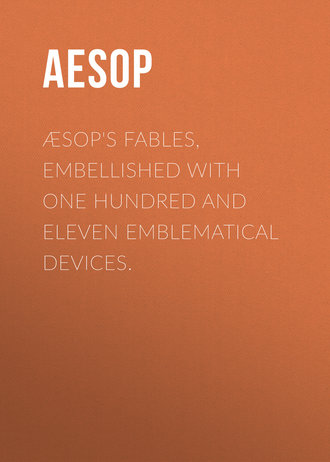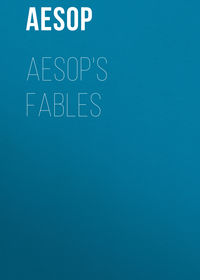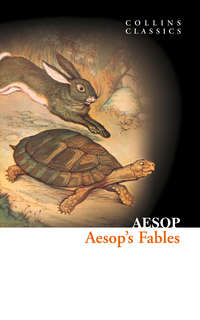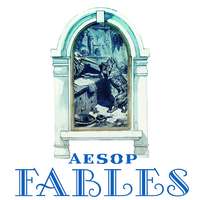 полная версия
полная версияÆsop's Fables, Embellished with One Hundred and Eleven Emblematical Devices.
FABLE LXII
THE OLD MAN AND HIS SONSAn Old Man had many Sons, who were often falling out with one another. When the Father had exerted his authority, and used other means in order to reconcile them, and all to no purpose, at last he had recourse to this expedient: he ordered his Sons to be called before him, and a short bundle of sticks to be brought; and then commanded them, one by one, to try if, with all their might and strength, they could any of them break it. They all tried, but to no purpose; for the sticks being closely and compactly bound up together, it was impossible for the force of man to do it. After this the Father ordered the bundle to be untied, and gave a single stick to each of his Sons; at the same time bidding him try to break it: which, when each did with all imaginable ease, the Father addressed himself to them to this effect – 'O my Sons, behold the power of unity! For if you, in like manner, would but keep yourselves strictly conjoined in the bonds of friendship, it would not be in the power of any mortal to hurt you; but when once the ties of brotherly affection are dissolved, how soon do you fall to pieces, and are liable to be violated by every injurious hand that assaults you!'
APPLICATIONNothing is more necessary towards completing and continuing the well-being of mankind, than their entering into and preserving friendships and alliances. The safety of a government depends chiefly upon this; and therefore it is weakened and exposed to its enemies, in proportion as it is divided by parties. "A kingdom divided against itself, is brought to desolation: " and the same holds good among all societies and corporations of men, from the constitution of the nation down to every little parochial vestry. But the necessity of friendship extends itself to all sorts of relations in life, as it conduces mightily to the advantage of particular clans and families. Those of the same blood and lineage have a natural disposition to unite together, which they ought by all means to cultivate and improve. It must be a great comfort to people, when they fall under any calamity, to know there are many others who sympathize with them; a great load of grief is mightily lessened, when it is parcelled out into many shares. And then joy, of all our passions, loves to be communicative, and generally increases in proportion to the number of those who partake of it with us. We defy the threats and malice of an enemy, when we are assured that he cannot attack us single, but must encounter a bundle of allies at the same time. But they that behave themselves so as to have few or no friends in the world, live in perpetual fear and jealousy of mankind, because they are sensible of their own weakness, and know themselves liable to be crushed, or broken to pieces, by the first aggressor.
FABLE LXIII
THE STAG AND THE FAWNA Stag, grown old and mischievous, was, according to custom, stamping with his foot, making offers with his head, and bellowing so terribly, that the whole herd quaked for fear of him: when one of the little Fawns coming up, addressed him to this purpose – 'Pray, what is the reason that you, who are so stout and formidable at all other times, if you do but hear the cry of the hounds, are ready to fly out of your skin for fear?' – 'What you observe is true,' replied the Stag, 'though I know not how to account for it: I am indeed vigorous, and able enough, I think, to make my party good any where, and often resolve with myself, that nothing shall ever dismay my courage for the future; but, alas! I no sooner hear the voice of a hound but all my spirits fail me, and I cannot help making off as fast as ever my legs can carry me.'
APPLICATIONThis is the case of many a cowardly bully in the world. He is disposed to be imperious and tyrannical, and to insult his companions, and takes all opportunities of acting according to his inclination; but yet is cautious where he makes his haunts, and takes care to have to do only with a herd of rascally people, as vile and mean as himself. A man of courage quashes him with a word; and he who has threatened death in every sentence, for a twelvemonth together, to those whom he knew it would affright, at the very frown of an intrepid man has leaped out of a window. It is no unpleasant sight to be present when any of these gentlemen happen to be disarmed of their terror before the face of their humble admirers: there is a strange boisterous struggle betwixt fear, shame, and revenge, which blinds them with confusion; and, though they would fain exert a little courage, and show themselves men, yet, they know not how; there is something within which will not suffer them to do it. The predominance of nature will show itself, upon occasion, in its true colours, through all the disguises which artful men endeavour to throw over it. Cowardice, particularly, gives us but the more suspicion when it would conceal itself under an affected fierceness; as they who would smother an ill smell by a cloud of perfume, are imagined to be but the more offensive. When we have done all, Nature will remain what she was, and show herself whenever she is called upon; therefore whatever we do in contradiction to her laws, is so forced and affected, that it must needs expose and make us ridiculous. We talk nonsense when we would argue against it: like Teague, who being asked why he fled from his colours, said, his heart was as good as any in the regiment; but protested his cowardly legs would run away with him whatever he could do.
FABLE LXIV
THE OLD HOUNDAn Old Hound, who had been an excellent good one in his time, and given his master great sport and satisfaction in many a chase, at last, by the effect of years, became feeble and unserviceable. However, being in the field one day, when the stag was almost run down, he happened to be the first that came in with him, and seized him by one of his haunches; but, his decayed and broken teeth not being able to keep their hold, the deer escaped, and threw him quite out. Upon which his master, being in a great passion, and going to strike him, the honest old creature is said to have barked out his apology – 'Ah! do not strike your poor old servant; it is not my heart and inclination, but my strength and speed, that fail me. If what I now am displeases, pray don't forget what I have been.'
APPLICATIONThis fable may serve to give us a general view of the ingratitude of the greatest part of mankind. Notwithstanding all the civility and complaisance that is used among people where there is a common intercourse of business, yet let the main spring, the probability of their being serviceable to each other, either in point of pleasure or profit, be but once broken, and farewell courtesy: so far from continuing any regard in behalf of past favours, it is very well if they forbear doing any thing that is injurious. If the master had only ceased to caress and make much of the Old Hound, when he was past doing any service, it had not been very strange; but to treat a poor creature ill, not for a failure of inclination, but merely a defect of nature, must, notwithstanding the crowd of examples there are to countenance it, be pronounced inhuman and unreasonable.
There are two accounts upon which people that have been useful are frequently neglected. One, when they are so decayed, either through age or some accident, that they are no longer able to do the services they have formerly done; the other, when the occasion or emergency which required such talents no longer exists. Phædrus, who more than once complains of the bad consequences of age, makes no other application to this fable than by telling his friend Philetus, with some regret, that he wrote it with such a view; having, it seems, been repaid with neglect, or worse usage, for services done in his youth to those who were then able to afford him a better recompense.
FABLE LXV
JUPITER AND THE CAMELThe Camel presented a petition to Jupiter, complaining of the hardship of his case in not having, like bulls and other creatures, horns, or any weapons of defence, to protect himself from the attacks of his enemies, and praying that relief might be given him in such manner as might be thought most expedient. Jupiter could not help smiling at the impertinent address of the great silly beast, but, however, rejected the petition; and told him that, so far from granting his unreasonable request, henceforward he would take care his ears should be shortened, as a punishment for his presumptuous importunity.
APPLICATIONThe nature of things is so fixed in every particular, that they are very weak superstitious people who dream it is to be altered. But, besides the impossibility of producing a change by addresses of this nature, they who employ much of their time upon such accounts, instead of getting, are sure to lose in the end. When any man is so frivolous and vexatious as to make unreasonable complaints, and to harbour undue repinings in his heart, his peevishness will lessen the real good which he possesses, and the sourness of his temper shorten that allowance of comfort which he already thinks too scanty. Thus, in truth, it is not Providence, but ourselves who punish our own importunity in soliciting for impossibilities, with a sharp corroding care, which abridges us of some part of that little pleasure which Providence has cast into our lot.
FABLE LXVI
THE FOX WITHOUT A TAILA Fox, being caught in a steel trap by his tail, was glad to compound for his escape with the loss of it; but, upon coming abroad into the world, began to be so sensible of the disgrace such a defect would bring upon him, that he almost wished he had died rather than left it behind him. However, to make the best of a bad matter, he formed a project in his head to call an assembly of the rest of the Foxes, and propose it for their imitation, as a fashion which would be very agreeable and becoming. He did so, and made a long harangue upon the unprofitableness of tails in general, and endeavoured chiefly to show the awkwardness and inconvenience of a Fox's tail in particular: adding, that it would be both more graceful and more expeditious to be altogether without them; and that, for his part, what he had only imagined and conjectured before, he now found by experience; for that he never enjoyed himself so well, and found himself so easy as he had done since he cut off his tail. He said no more, but looked about with a brisk air, to see what proselytes he had gained; when a sly old thief in the company, who understood trap, answered him with a leer – 'I believe you may have found a conveniency in parting with your tail, and when we are in the same circumstances, perhaps we may do so too.'
APPLICATIONIf men were but generally as prudent as Foxes, they would not suffer so many silly fashions to obtain as are daily brought in vogue, for which scarce any reason can be assigned besides the humour of some conceited vain creature; unless, which is full as bad, they are intended to palliate some defect in the person that introduces them. The petticoat of a whole sex has been sometimes swelled to such a prodigious extent, to screen an enormity of which only one of them has been guilty. And it is no wonder that Alexander the Great could bring a wry-neck into fashion, in a nation of slaves, when we consider what power of this nature some little, insignificant, dapper fellows have had among a free people.
FABLE LXVII
THE FOX AND THE CROWA Crow having taken a piece of cheese out of a cottage window, flew up into a high tree with it, in order to eat it; which a Fox observing, came and sat underneath, and began to compliment the Crow upon the subject of her beauty. 'I protest,' says he, 'I never observed it before, but your feathers are of a more delicate white than any that ever I saw in my life! Ah; what a fine shape and graceful turn of body is there! And I make no question but you have a tolerable voice. If it is but as fine as your complexion, I do not know a bird that can pretend to stand in competition with you.' The Crow, tickled with this very civil language, nestled and riggled about, and hardly knew where she was; but thinking the Fox a little dubious as to the particular of her voice, and having a mind to set him right in that matter, began to sing, and in the same instant let the cheese drop out of her mouth. This being what the Fox wanted, he chopped it up in a moment, and trotted away, laughing to himself at the easy credulity of the Crow.
APPLICATIONThey that love flattery (as it is to be feared too many do) are in a fair way to repent of their foible in the long run. And yet how few are there among the whole race of mankind who may be said to be full proof against its attacks! The gross way by which it is managed by some silly practitioners, is enough to alarm the dullest apprehension, and make it to value itself upon the quickness of its insight into the little plots of this nature: but let the ambuscade be disposed with due judgment, and it will scarce fail of seizing the most guarded heart. How many are tickled to the last degree with the pleasure of flattery, even while they are applauded for their honest detestation of it! There is no way to baffle the force of this engine but by every one's examining, impartially for himself, the true estimate of his own qualities: if he deals sincerely in the matter, nobody can tell so well as himself what degree of esteem ought to attend any of his actions, and therefore he should be entirely easy as to the opinion men are like to have of them in the world. If they attribute more to him than is his due, they are either designing or mistaken: if they allow him less, they are envious, or, possibly, still mistaken; and, in either case, are to be despised or disregarded. For he that flatters, without designing to take advantage of it, is a fool; and whoever encourages that flattery which he has sense enough to see through, is a vain coxcomb.
FABLE LXVIII
THE HAWK AND THE FARMERA Hawk, pursuing a Pigeon over a corn-field with great eagerness and force, threw himself into a net which a husbandman had planted there to take the Crows; who being employed not far off, and seeing the Hawk fluttering in the net, came and took him: but, just as he was going to kill him, the Hawk besought him to let him go, assuring him that he was only following a Pigeon, and neither intended nor had done any harm to him. To whom the Farmer replied – 'And what harm had the poor Pigeon done to you?' Upon which he wrung his head off immediately.
APPLICATIONPassion, prejudice, or power, may so far blind a man as not to suffer him justly to distinguish whether he is not acting injuriously at the same time that he fancies he is only doing his duty. Now the best way of being convinced, whether what we do is reasonable and fit, is to put ourselves in the place of the persons with whom we are concerned, and then consult our conscience about the rectitude of our behaviour. For this we may be assured of, that we are acting wrong whenever we are doing any thing to another which we should think unjust if it was done to us. Nothing but an habitual inadvertency, as to this particular, can be the occasion that so many ingenious noble spirits are often engaged in courses so opposite to virtue and honour. He that would startle, if a little attorney should tamper with him to forswear himself, to bring off some small offender, some ordinary trespasser, will, without scruple, infringe the constitution of his country for the precarious prospect of a place or a pension. Which is most corrupt, he that lies, like a knight of the post, for half-a-crown and a dinner, or he that does it for the more substantial consideration of a thousand pounds a year? Which would be doing most service to the public, giving true testimony in a cause between two private men, and against one little common thief who has stolen a gold watch; or voting honestly and courageously against a rogue of state, who has gagged and bound the laws, and stripped the nation? Let those who intend to act justly, but view things in this light, and all would be well. There would be no danger of their oppressing others, or fear of being oppressed themselves.
FABLE LXIX
THE NURSE AND THE WOLFA nurse, who was endeavouring to quiet a froward bawling child, among other attempts, threatened to throw it out of doors to the Wolf, if it did not leave off crying. A Wolf, who chanced to be prowling near the door, just at that time, heard the expression, and believing the woman to be in earnest, waited a long while about the house, in expectation of seeing her words made good. But at last the child, wearied with its own importunities, fell asleep, and the poor Wolf was forced to return back to the woods empty and supperless. The Fox meeting him, and surprised to see him going home so thin and disconsolate, asked him what the matter was, and how he came to speed no better that night? – 'Ah! do not ask me,' says he; 'I was so silly as to believe what the Nurse said, and have been disappointed.'
APPLICATIONAll the moralists have agreed to interpret this fable as a caution to us never to trust a woman. What reasons they could have for giving so rough and uncourtly a precept, is not easy to be imagined: for, however fickle and unstable some women may be, it is well known there are several who have a greater regard for truth, in what they assert or promise, than most men. There is not room, in so short a compass, to express a due concern for the honour of the ladies upon this occasion, nor to show how much one is disposed to vindicate them: and, though there is nothing bad which can be said to them but may with equal justice be averred of the other sex, yet one would not venture to give them quite so absolute a precaution as the old mythologists have affixed to this fable; but only to advise them to consider well and thoroughly of the matter before they trust any man living.
FABLE LXX
THE HARE AND THE TORTOISEA Hare insulted a tortoise upon account of his slowness, and vainly boasted of her own great speed in running. – 'Let us make a match,' replied the Tortoise; 'I will run with you five miles for five pounds, and the Fox yonder shall be the umpire of the race.' The Hare agreed; and away they both started together. But the Hare, by reason of her exceeding swiftness, outran the Tortoise to such a degree, that she made a jest of the matter; and, finding herself a little tired, squatted in a tuft of fern that grew by the way, and took a nap; thinking that, if the Tortoise went by, she could at any time fetch him up with all the ease imaginable. In the meanwhile the Tortoise came jogging on with slow but continued motion; and the Hare, out of a too great security and confidence of victory, oversleeping herself, the Tortoise arrived at the end of the race first.
APPLICATIONIndustry and application to business makes amends for the want of a quick and ready wit. Hence it is, that the victory is not always to the strong, nor the race to the swift. Men of fine parts are apt to despise the drudgery of business; but, by affecting to show the superiority of their genius, upon many occasions, they run into too great an extreme the other way; and the administration of their affairs is ruined through idleness and neglect. What advantage has a man from the fertility of his invention, and the vivacity of his imagination, unless his resolutions are executed with a suitable and uninterrupted rapidity? In short, your men of wit and fire, as they are called, are oftentimes sots, slovens, and lazy fellows: they are generally proud and conceited to the last degree; and, in the main, not the fittest persons for either conversation or business. Such is their vanity, they think the sprightliness of their humour inconsistent with a plain sober way of thinking and speaking, and able to atone for all the little neglects of their business and persons. But the world will not be thus imposed upon; the man who would gain the esteem of others, and make his own fortune, must be one that carries his point effectually, and finishes his course without swerving or loitering. Men of dull parts, and a slow apprehension, assisted by a continued diligence, are more likely to attain this than your brisk retailers of wit, with their affected spleen and indolence. And if business be but well done, no matter whether it be done by the sallies of a refined wit, or the considering head of a plain plodding man.
FABLE LXXI
THE YOUNG MAN AND HIS CATA certain Young Man used to play with a Cat, of which he grew so fond, that at last he fell in love with it, and to such a degree, that he could rest neither night nor day for the excess of his passion. At last he prayed to Venus, the goddess of beauty, to pity him, and relieve his pain. The good-natured goddess was propitious, and heard his prayers: before he rose up from kneeling, the Cat, which he held in his arms, was transformed into a beautiful girl. The Youth was transported with joy, and married her that very day. At night they went to bed, and as the new bride lay encircled in the embraces of her amorous husband, she unfortunately heard a Mouse behind the hangings, and sprung from his arms to pursue it. Venus, offended to see her sacred rites profaned by such an indecent behaviour, and perceiving that her new convert, though a woman in outward appearance, was a Cat in her heart, she made her return to her old form again, that her manners and person might be agreeable to each other.
APPLICATIONPeople, as to their manners and behaviour, take a strong bias from custom and education, but a much stronger from Nature. Her laws are so strong, that it is in vain for us to go to oppose them; we may refine and improve, but can never totally alter her works. Upon this account it is that we oftentimes see silly awkward blockheads displaying their idiotism and folly through all their ensigns of dignity; for some natures are so coarse and rustic, that all the embroidery of a court cannot conceal them. Doubtless such people were intended by Nature for nothing above driving Hogs to a fair, and laughing at the jokes of a country Merry Andrew. Fortune has found them worthy of her favours, and given them a lift out of the mire: but yet they do not fail to give frequent indications of their true composition, by a thousand little dirty actions. A fine equipage, and a great estate, may raise a man to an exalted station, and procure a respect to his outward person; notwithstanding which it may so happen, that every time he speaks and acts he cannot help playing the fool for the blood of him.
FABLE LXXII
THE ASS IN THE LION'S SKINAn Ass finding the skin of a Lion, put it on; and, going into the woods and pastures, threw all the flocks and herds into a terrible consternation. At last, meeting his owner, he would have frightened him also; but the good man, seeing his long ears slick out, presently knew him, and with a good cudgel made him sensible that, notwithstanding his being dressed in a Lion's Skin, he was really no more than an Ass.
APPLICATIONAs all affectation is wrong, and tends to expose and make a man ridiculous, so the more distant he is from the thing which he affects to appear, the stronger will the ridicule be which he excites, and the greater the inconveniences into which he runs himself thereby. How strangely absurd it is for a timorous person to procure a military post in order to keep himself out of danger! and to fancy a red coat the surest protection for cowardice! yet there have been those who have purchased a commission to avoid being insulted; and have been so silly as to think courage was interwoven with a sash, or tied up in a cockade. But it would not be amiss for such gentlemen to consider, that it is not in the power of scarlet cloth to alter nature; and that, as it is expected a soldier should show himself a man of courage and intrepidity upon all proper occasions, they may, by this means, meet the disgrace they intended to avoid, and appear greater asses than they need to have done. However, it is not in point of fortitude only that people are liable to expose themselves, by assuming a character to which they are not equal; but he who puts on a show of learning, of religion, of a superior capacity in any respect, or, in short, of any virtue or knowledge to which he has no proper claim, is, and will always be found to be, "An Ass in a Lion's Skin."





